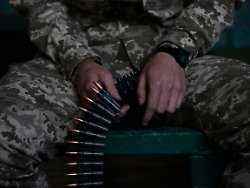Allies and Enemies in War
Why are Chechens fighting for Ukraine too?
06/21/2022, 08:51 am
When it comes to the deployment of Chechen fighters in the Ukraine war, the notorious commandos of ruler Kadyrov usually make the headlines. But many of his compatriots don’t support Moscow, but Kyiv – here two of them explain why.
The Chechen fighters in Ukraine are easy to spot: their heads are shaved, their beards are long. Their deployment alongside the Ukrainian army is particularly risky. “If the Russians catch me, I won’t be exchanged, I’ll be tortured and then shown on TV,” fears Islam, one of the volunteers fighting near Zaporizhia.
The 33-year-old Chechen fled his homeland to Poland almost two decades ago. There he could live in peace. But after the Russian attack on the neighboring country, Islam joined the Sheikh Mansur Battalion. The unit was founded in 2014 after the Russian annexation of the Ukrainian peninsula of Crimea, and most of its members are veterans of the Chechen wars.
“Several hundred” Chechens are currently fighting Russian troops in Ukraine, says Islam. How many exactly and where they are in use, he does not want to say. Neither does his full name – to protect his relatives in Chechnya from reprisals.
The war as déjà vu
Chechens are also fighting on the other side of the front: Kremlin loyalists who have joined the notorious commandos of Chechen ruler Ramzan Kadyrov. There is talk of 8,000 men – a number that cannot be checked. “We want to show that not all Chechens are like them, but that many of us see the Russians as aggressors and occupiers,” says Islam to the sound of sirens announcing another Russian air strike.
For Islam, the war here is déjà vu. “It’s like going back in time, a continuation of what started in the Caucasus,” he says. Moscow devastated the Chechen capital of Grozny in two wars, and the Ukrainian port of Mariupol has now suffered the same fate. Hundreds of thousands of Chechens fled, and an estimated 250,000 now live in Europe, Turkey and the United Arab Emirates.
“I want to whitewash the honor of the Chechens, whom Moscow is trying to portray as terrorists,” says Islam. That’s why he not only fights, but also documents alleged Russian war crimes on the Internet and is therefore threatened.
It started with distrust
Mansur, a 40-year-old colossus with many scars, is the deputy commander of Islam’s unit. “Two of us are dead, others are injured. But it’s important that we’re here. We have to teach the local soldiers something about the war,” says Mansur.
Before the war, Ukrainian authorities viewed Chechen volunteers with suspicion because many Chechens living in Europe had joined the jihadist militia Islamic State (IS). At Moscow’s request, pro-Russian officials put some of them on a terrorist sanctions list. “But that was all before the invasion, now the government’s view of us has changed,” says Islam. Now they would be seen as “allies”.
The Chechens are not officially part of the Ukrainian army. But they are equipped with captured weapons, and the Christian-Orthodox population provides the Muslim volunteers with food. “We’re not here to impose Islamic beliefs on Ukrainians,” says Mansur. “But to fight a common enemy and defend freedom.”
